- Home
- Barbara Pym
An Unsuitable Attachment Page 20
An Unsuitable Attachment Read online
Page 20
'Mrs Ainger, it is really you we want to see,' said the woman. 'I think you know my niece, Ianthe Broome.'
'Ianthe? Yes, of course — do come in,' said Sophia, for now she was beginning to realize who they were. The memory of the Lenten addresses on those cold Wednesday evenings came back to her. Even today, when the weather was warm, the woman was wearing a light fur coat, summer ermine, Sophia believed it was. Could it be that Ianthe's uncle and aunt had come to 'call' in a rather splendid Edwardian way? And had there been nobody at home, would Mrs Burdon have left one of her own cards and two of her husband's? One of them might even have been turned down at the corner for some mysterious reason which Sophia had now forgotten.
'I was just going to make tea,' she said, showing them into the drawing room.
'Well, thank you — a cup of tea will certainly make things easier,' said Bertha Burdon, rather to Sophia's surprise, for surely that was the kind of thing one thought rather than said?
'What my wife means is that it will make it easier to discuss this worrying business,' said Randolph Burdon hastily.
'Of course I meant that,' said Bertha sharply. 'Mrs Ainger would think me very discourteous if I had meant anything else.'
Fortunately Sophia had made a cake that morning and it looked almost as good as one of Sister Dew's. She made the tea, deciding that Earl Grey would be appropriate just as wines are on various occasions, and cut some thin brown bread and butter. It was only when she was wondering whether they would prefer strawberry jam or quince jelly that it occurred to her to wonder what 'this worrying business' could be. Had something happened to Ianthe that she didn't know about? Sophia went back into the drawing room with the tea-tray feeling rather apprehensive.
'I hope Ianthe is all right?' she said.
'Then you haven't heard?' 'Bertha asked.
'No.' What could it be? Sophia wondered. Something to do with a man, perhaps, though that seemed unlike Ianthe. But what was it she had said at Ravello about being in love with somebody? Sophia had hardly taken it seriously at the time.
'She has announced her intention of marrying,' said Randolph. 'Ah, is that quince jelly, I see? How delicious!'
'A most unfortunate choice,' Bertha continued, obviously irritated by her husband's allowing himself to be diverted by the quince jelly. 'The man is several years younger than she is and inferior to her socially.'
'Then it must be the young man from the library?' Sophia asked. Her feelings on hearing the news were mixed; surprise and disappointment that Ianthe should be acting out of character — disregarding the advice she had been given at Ravello — and relief that she had not chosen to marry Rupert Stonebird.
'You know him, then?' asked Bertha sharply.
'Not really — he came to our Christmas bazaar but I can't remember much about him.'
'From what Ianthe tells me he doesn't sound at all what one would have wished for her.'
Sophia refilled the tea cups. 'I don't quite see what I can do,' she said at last, Ianthe is old enough to know what she's doing.'
'You could tell her what a mistake she is making — she would respect your opinion,' said Bertha.
'But do people respect each other's opinions in cases like this, unless they happen to agree with their own?' Sophia protested. People have been doing this from time immemorial, she thought, advising each other to marry or not to marry and how often does it do any good. Indeed, she began to wonder uneasily if it had been her advice to Ianthe not to marry that had decided her to take this step. 'I had a conversation with Ianthe when we were in Italy,' she said, 'and we certainly did talk about marriage and that sort of thing.'
'And did she reveal anything?' asked Bertha eagerly.
'She told me she loved this young man — John, isn't it — but I never realized that she wanted to marry him,' said Sophia.
'At least he works in a library,' Bertha murmured, 'one does feel that is something.''
'He is not, I understand, a qualified librarian?' asked Randolph in a brisker tone, as if he had decided to make the best of a bad job.
'No, I don't think so,' said Sophia.
'Perhaps if they love each other . . .' Bertha seemed to bring out the words with difficulty, perhaps because she had heard rather than experienced what love was and what it could drive people to. In her case there had been no love and no driving, only a good and suitable match that her parents had encouraged, but it was only at this moment, contemplating Ianthe's foolishness, that she realized almost with regret that she herself had never loved.
'But there is the rest of their lives,' said Sophia, 'and marriage is for a long time. What will they talk about in the evenings when the novelty has worn of!?'
'In the evenings?' asked Bertha in a puzzled tone which made Sophia think that perhaps her life with Randolph Burdon did not have evenings in the way that of other married couples did.
'The man can go to his club while the woman does needlework or watches the television,' said Randolph, 'so conversation in the evenings need not be a problem. She could always make quince jelly of course,' he added, with a distressing lack of seriousness. 'This is so delicious, Mrs Ainger, that I am going to take the last spoonful. A pity my wife has not the strength to do these things.'
'And quinces do not grow in Mayfair, anyway,' said Bertha complacently.
'My mother sends them up from the country,' said . Sophia. 'I'll give you a pot to take away with you.'
'So kind of you,' said Randolph. 'You have really been most helpful.'
At least he would be taking away a pot of his favourite jelly, Sophia thought, which was a great deal more than one usually got out of trying to interfere in other people's business.
'I suppose Ianthe didn't give you any idea when she was going to get married? I imagine she'd want you to marry them?' Sophia asked, as she saw her visitors out of the gate.
'That's another thing,' said Randolph. 'She suggested August, if you please.'
'August? Yes, that does seem rather soon,' said Sophia.
'It is quite out of the question as far as we are concerned,' said Randolph. 'She must know that my church is always closed in August — none of my parishioners would dream of being in London in August and Bertha and I always go either to the Riviera or the Italian lakes at that time. This year, we have arranged to go to Estoril where I believe the climate is delightful. By the way, do you think your husband could be persuaded to preach at our dedication festival in October? We need a man with experience of a parish like this to shake my good people up a bit.'
'I'm sure they don't need shaking up any more than people do here,' said Sophia, 'and I'm sure Mark would like to preach very much.' What a splendid opportunity it would be for him to use one of his famous 'openings'. 'A few months ago, as I was sitting in Doney's on the Via Veneto, where many of you . . .' She would suggest it to him.
'But as I keep telling Randolph,' Bertha was saying rather plaintively, 'somebody must minister to the rich.'
'I expected Mark would be in before now,' said Sophia. 'He'll be sorry to have missed you.'
They continued a little longer chatting by the Burdons' car, the main purpose of their visit temporarily forgotten.
'Perhaps we shouldn't have come,' said Bertha, arranging her fur coat so that she should not squash the fur by sitting on it, 'but we were worried about Ianthe. I never really cared for my sister-in-law,' she said to Sophia in a low voice, 'but I know how upset she would be at the idea of Ianthe making this mistake. Of course Ianthe was too much with her mother after my brother died — otherwise she might have got this sort of foolishness over when she was younger. But there they were living on top of each other in that flat, much too near Westminster Cathedral — I always felt it most oppressive when I went to see them, the cathedral towering over them like that. And one could even see the canons going in and out — Roman canons, of course . . .' her voice trailed off uncertainly and she began to fuss with the pot of quince jelly which was balanced rather unsafely in the glove com
partment.
'I dare say nothing will come of this business,' said Randolph, getting into the car. 'Ianthe may come to her senses.'
They drove off, waving to Sophia. She strolled back into the house, wondering why Ianthe had not told her that she was going to marry John and feeling a little hurt by her lack of friendliness. Then it occurred to her suddenly that perhaps Ianthe didn't really like her. We assume that nice women — clergymen's wives and canons' daughters — who go to the same church will get on well together and be friends, that they must of necessity be friends, but why should they be? All this time Sophia had thought that she knew Ianthe and could predict how she would behave, and now she had done this. I must have left out 'the human element', she thought, the phrase coming into her mind as a convenient tag to explain unexpected behaviour. She was still brooding over her failure when Mark came in.
'I've got news for you,' she said, when a decent interval had elapsed. 'Guess what it is?'
'Something to do with Faustina?' he suggested indulgently.
'No, though I was just trying to give her some liquid paraffin when they came.'
'Who came?'
'Ianthe's aunt and uncle — the Burdons — and he wants you to preach at their dedication festival.'
'I should like to very much — when is it?'
'In October, I think. He'll be writing to you. And you're to give them a sermon suitable for rich people.'
'How do they differ spiritually from others?' Mark asked.
'That's what I wondered,' said Sophia. 'But at least you'll be justified in giving them one of your best beginnings.'
'Yes, they will surely have stood in St Peter's or at Delphi and even further afield than that.'
'There was other news too,' said Sophia, unable to contain herself any longer. 'Rather surprising, almost dreadful, news. Apparently Ianthe has told them that she intends to marry that young man from the library where she works — you remember, he came to the Christmas bazaar.'
'Really?' said Mark absently.
'But she wants to marry him,' Sophia persisted, 'and that surely can't be a good thing.'
'No, better not to marry,' he agreed, but he was thinking not of Ianthe and the young man from the library, but rather of the clergy in general and perhaps at that moment of himself in particular. How could Faustina's hairs have got here, he had asked himself at the early Mass that morning, seeing them on the fair linen cloth on the altar.
'And apparently he isn't a qualified librarian.'
'Oh, I don't see why librarians as such shouldn't marry, whether qualified or not,' said Mark, still not quite appreciating the point Sophia was trying to make.
'Darling, the celibacy or not of librarians is neither here nor there,' she said a little impatiently, 'but this young man is quite unsuitable for Ianthe.'
'Ianthe?' he said suddenly realizing who Sophia was talking about. 'What does she want to get married for? Isn't she quite happy as she is in her charming little house?'
'No, that doesn't seem to be enough,' said Sophia. 'We've both had this picture of her which was so pleasing and comfortable and all the time she's been wanting something more.'
'Well, yes . . .' said Mark feeling rather at a loss. 'It's difficult to see what one can do to dissuade a woman of Ianthe's age from making what seems to us an unsuitable marriage.'
'Penny will be interested to hear about this,' Sophia went on. 'I suppose there's no harm in telling her tonight.'
'Tonight?'
'Yes — had you forgotten? We've been invited to supper with her.'
'But can she cook anything on that gas ring?' asked Mark apprehensively, for he was hungry and had been looking forward to one of Sophia's spaghettis which she had been cooking enthusiastically since the visit to Italy.
'At least I can provide you with a reasonable spaghetti,' said Penelope, welcoming them at the front door. 'And I've got a bottle of Chianti.'
'I didn't know you could cook,' said Mark.
'Well, I'm learning. It seems the best thing to do now and it gives me an interest.' Penelope sounded subdued and looked somehow different. Her hair was smoother and neater and she wore an ostentatiously simple dark blue dress.
'But this is excellent!' exclaimed Mark, in the rather unflatteringly surprised way people sometimes talk when provided with unexpectedly good food.
'And you've put basil in it, like I told you,' said Sophia.
'Yes, and I used a tin of tomatoes, and cooked it all very slowly for hours and hours.'
Mark felt rather out of place in the bed-sitting room, too big for the small space which seemed only just big enough for the two women so obviously wanting to have a sisterly talk.
After they had all drunk an indefinite toast in the Chianti Sophia came out with the news about Ianthe.
'The dark man?' asked Penelope. 'And I saw her with the other — the fair one — having dinner in a restaurant that's just opened near here. And now she's going to marry the dark one. Oh, well . . .'
'I should have thought Rupert Stonebird would be the one for her,' said Mark, feeling able to make this rather intelligent comment.
'Oh no,' said Sophia firmly. 'I made that quite clear when we were in Ravello. I said that I'd arranged for Rupert to marry Penny.'
'Sophia, you didn't!' Penelope burst out in horror.
'And why not?' Sophia protested.
'No, what difference can it make,' said Penelope more calmly. 'It doesn't really matter — I shall never marry now.'
Mark sat silent, not unduly surprised by her statement, for he was used to people, especially women, not marrying. But Ianthe had been the one he had seen as the splendid unmarried woman, so dependable and such a pillar of the church. He felt slightly apprehensive at the idea of Penelope attempting to fill this role. Drinking his coffee he watched the sisters warily as they, now forgetting his presence, began talking about why Penelope would never marry. It seemed to be something that had happened in Rome, some sort of disaster ending in tears, and then somebody — perhaps the same person? — had actually suggested they might go for a walk some time . . . Mark couldn't make out what it was all about.
His attention strayed to Penelope's bookshelves to see if he could find something there to while away the time. He saw a volume of Donne's poetry and prose and turning to the sermons he began to consider what he could preach about at Ianthe's uncle's dedication festival. 'A sermon suitable for rich people,' Sophia had said, and he came upon the words 'Our critical day is not the very day of our death: but the whole course of our life', which might well do as a text for rich and poor alike. He remembered with irritation that somebody had approached him that afternoon with a complaint about Father Anstruther, who had taken the services when he had been away after Easter. After all this time some 'uncalled-for' remark had been brought up — Mark couldn't even remember now exactly what it had been — and he found himself having to make excuses for Father Anstruther and protest that he couldn't really have meant what he had seemed to . . .
'And then,' said Penelope, 'it wasn't so much that as what he called me — a jolly little thing — wasn't it terrible? . . .'
Mark turned away from the sermons to the love poems at which the book seemed to open more easily. A pressed flower fell out on to the floor and lay on the carpet, dark and dry. The things women did, he thought with resignation. Stooping down he picked up the flower and replaced it, wondering if he had put it in at the right poem and if it really mattered if he hadn't.
21
Ianthe was surprised how much courage it took to break the news of her engagement to Mervyn. She and John had decided that it would be better if she did it, not only because of her senior status in the library, but also because of the unusual and in some way privileged relationship she had with Mervyn, who could now be seen as a rejected suitor.
Obviously it would have been better to have broken the news first thing in the morning, without thinking of the repercussions, but after Mervyn had come into the room and nothing ha
d been said then it seemed that the opportunity had gone. Besides, Mervyn was in a bad temper because of a letter he had received.
'I will not have books taken away from the library,' he declared.
Ianthe did not improve matters by protesting mildly that books were meant to be read and that she saw no harm in people taking them away if they were known to be bona fide scholars.
'And how is one to know that?' Mervyn asked. 'This letter from somebody called R.J. Stonebird claims that this young man is one of his students — how am I to know that it's genuine?'
'Rupert Stonebird?' said Ianthe, feeling rather uncomfortable. 'He's a lecturer in Anthropology at London University.'
'So he says, but it doesn't impress me,' said Mervyn. 'These red brick universities don't impress me at all.'
'Well, you can hardly call London "red brick",' said Ianthe. 'Just think of the Senate House, all grey. And University College in Gower Street is really quite classical. As a matter of fact, you've met Rupert Stonebird — he's one of my neighbours.'
'Oh, then I suppose you put him up to writing this letter?'
'No, of course I didn't — but don't you remember after the Christmas bazaar, you and John and I and the vicar's sister-in-law and Rupert Stonebird . . .'
'And Uncle Tom Cobbleigh too, I suppose,' interrupted Mervyn sarcastically.
'You came and had a glass of sherry at my house,' said Ianthe.
'Of course, dear — your charming little house,' he said, softening a little at the idea of the house. 'But I don't remember this Stonebird.'
How much easier it would have been had Rupert been the man! Ianthe thought, for this would have been a good opportunity to break the news. It was ridiculous that she hadn't managed to tell Mervyn yet. John was going to buy her an engagement ring at lunchtime and it was nearly that now. If only the subject could be brought round to something connected with marriage.
'What are the books this man wants to take away?' she asked at last.

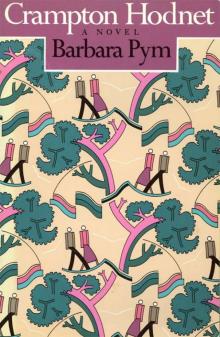 Crampton Hodnet
Crampton Hodnet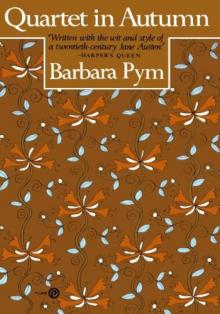 Quartet in Autumn
Quartet in Autumn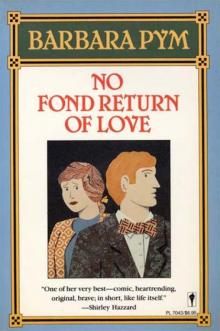 No Fond Return of Love
No Fond Return of Love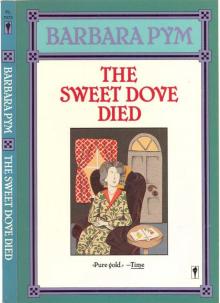 The Sweet Dove Died
The Sweet Dove Died Excellent Women
Excellent Women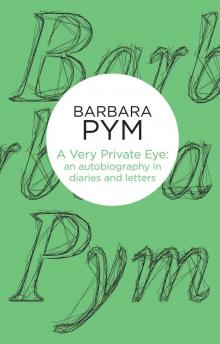 A Very Private Eye: The Diaries, Letters and Notebooks of Barbara Pym
A Very Private Eye: The Diaries, Letters and Notebooks of Barbara Pym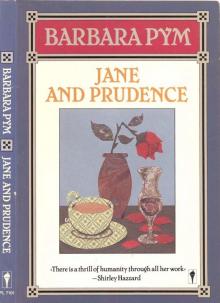 Jane and Prudence
Jane and Prudence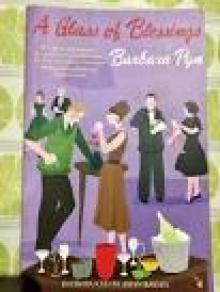 A Glass of Blessings
A Glass of Blessings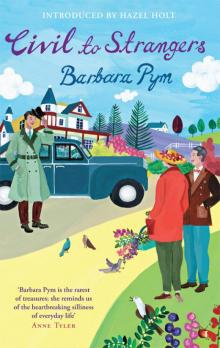 Civil to Strangers and Other Writings
Civil to Strangers and Other Writings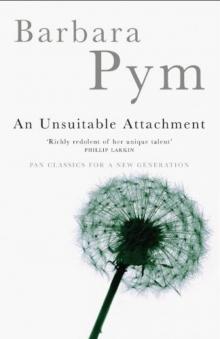 An Unsuitable Attachment
An Unsuitable Attachment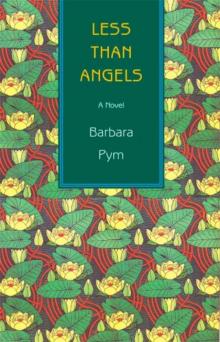 Less Than Angels
Less Than Angels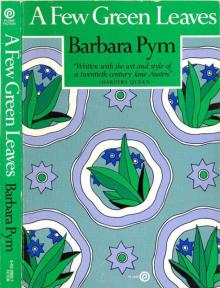 A Few Green Leaves
A Few Green Leaves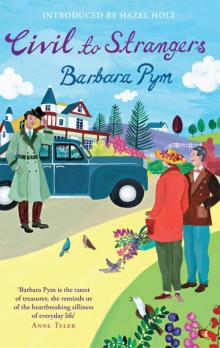 Civil to Strangers
Civil to Strangers